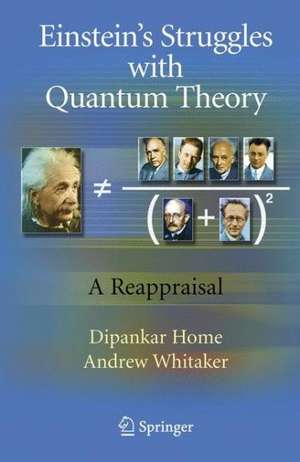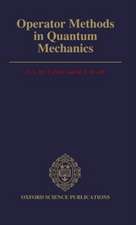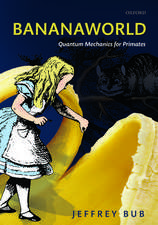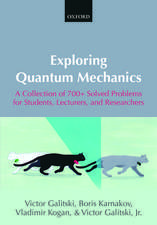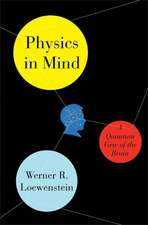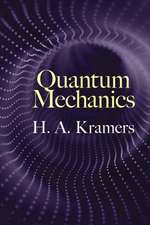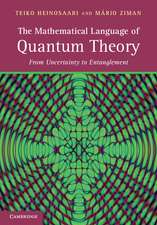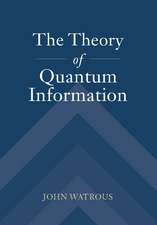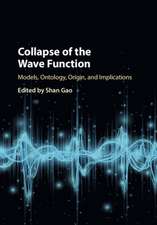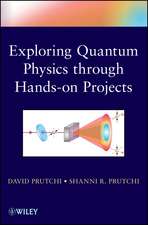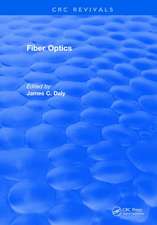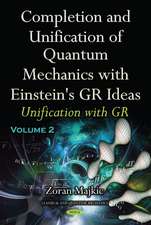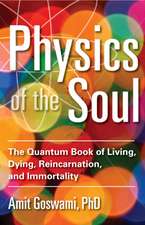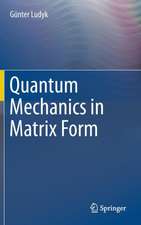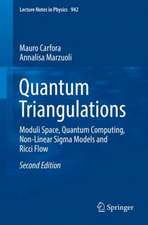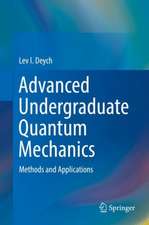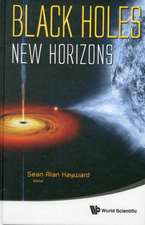Einstein’s Struggles with Quantum Theory: A Reappraisal
Autor Dipankar Home, Andrew Whitakeren Limba Engleză Paperback – 29 oct 2010
| Toate formatele și edițiile | Preț | Express |
|---|---|---|
| Paperback (1) | 645.28 lei 6-8 săpt. | |
| Springer – 29 oct 2010 | 645.28 lei 6-8 săpt. | |
| Hardback (1) | 651.67 lei 6-8 săpt. | |
| Springer – 21 iun 2007 | 651.67 lei 6-8 săpt. |
Preț: 645.28 lei
Preț vechi: 759.15 lei
-15% Nou
Puncte Express: 968
Preț estimativ în valută:
123.47€ • 129.26$ • 102.17£
123.47€ • 129.26$ • 102.17£
Carte tipărită la comandă
Livrare economică 05-19 aprilie
Preluare comenzi: 021 569.72.76
Specificații
ISBN-13: 9781441924452
ISBN-10: 1441924450
Pagini: 396
Ilustrații: XXII, 370 p.
Dimensiuni: 155 x 235 x 21 mm
Greutate: 0.55 kg
Ediția:Softcover reprint of hardcover 1st ed. 2007
Editura: Springer
Colecția Springer
Locul publicării:New York, NY, United States
ISBN-10: 1441924450
Pagini: 396
Ilustrații: XXII, 370 p.
Dimensiuni: 155 x 235 x 21 mm
Greutate: 0.55 kg
Ediția:Softcover reprint of hardcover 1st ed. 2007
Editura: Springer
Colecția Springer
Locul publicării:New York, NY, United States
Public țintă
ResearchCuprins
A Setting the Scene.- The Philosophical Background Einstein and Mach.- Einstein and Quantum Theory: The Early Years.- Quantum Mechanics and its Fundamental Issues.- The Standard Interpretation of Quantum Mechanics.- B Einstein Confronting Quantum Theory from 1925.- Einstein’s Approaches to Quantum Theory 1925-1935.- EPR and its Aftermath.- Einstein and the Macroscopic Limit of Quantum Mechanics.- Summary of Einstein’s Views.- C Denouement.- Bell’s Contributions and Quantum Non-locality.- Non-standard Quantum Interpretations.- Einstein and Quantum Information Theory.- Bridging the Quantum-Classical Divide.- D Looking Forward.- Quantum Foundations: General Outlook.- Assessment of Einstein’s Views and Contributions.
Recenzii
From the reviews:
"The book is serious, competent, and most engaging. Its declared aim is a reappraisal of Einstein’s critical attitude toward quantum theory. … I recommend Einstein’s Struggles with Quantum Theory to physicists who are interested in their past and to historians and philosophers who are curious about today’s quantum physics." (Tilman Sauer, Physics Today, May, 2008)
"This fascinating book presents and defends Einstein’s work on quantum theory. … Let me sum up by saying that I recommend this book in the very highest of terms: Home and Whitaker have produced a wonderful book that will appeal to physicists, historians, and philosophers alike. … Indeed, this book constitutes an excellent argument for quantum foundations research. Furthermore, although nominally about Einstein’s views, given its range, simplicity, and clarity I think it would make an excellent ‘first encounter’ with quantum theory." (Dean Rickles, Mathematical Reviews, Issue 2008 g)
"The authors feel … that their book is the first to provide a comprehensive account of Einstein’s encounter with quantum theory. … the book should be of interest to a wide range of readers. Anybody with an interest in Einstein and quantum theory should be able understand the main themes of the book and appreciate Einstein’s underestimated influence in quantum theory." (Roland Carchon, Physicalia Magazine, Vol. 30 (4), 2008)
"This book presents a lot of commented historical facts together with the respective references. … this book is a precious and useful contribution to the history of quantum mechanics which especially gives insight into the thinking and influence to the development of quantum theory by Albert Einstein." (K.-E. Hellwig, Zentralblatt MATH, Vol. 1167, 2009)
"The book is serious, competent, and most engaging. Its declared aim is a reappraisal of Einstein’s critical attitude toward quantum theory. … I recommend Einstein’s Struggles with Quantum Theory to physicists who are interested in their past and to historians and philosophers who are curious about today’s quantum physics." (Tilman Sauer, Physics Today, May, 2008)
"This fascinating book presents and defends Einstein’s work on quantum theory. … Let me sum up by saying that I recommend this book in the very highest of terms: Home and Whitaker have produced a wonderful book that will appeal to physicists, historians, and philosophers alike. … Indeed, this book constitutes an excellent argument for quantum foundations research. Furthermore, although nominally about Einstein’s views, given its range, simplicity, and clarity I think it would make an excellent ‘first encounter’ with quantum theory." (Dean Rickles, Mathematical Reviews, Issue 2008 g)
"The authors feel … that their book is the first to provide a comprehensive account of Einstein’s encounter with quantum theory. … the book should be of interest to a wide range of readers. Anybody with an interest in Einstein and quantum theory should be able understand the main themes of the book and appreciate Einstein’s underestimated influence in quantum theory." (Roland Carchon, Physicalia Magazine, Vol. 30 (4), 2008)
"This book presents a lot of commented historical facts together with the respective references. … this book is a precious and useful contribution to the history of quantum mechanics which especially gives insight into the thinking and influence to the development of quantum theory by Albert Einstein." (K.-E. Hellwig, Zentralblatt MATH, Vol. 1167, 2009)
Notă biografică
Dipankar Home is Professor of Physics at Bose Institute, Calcutta. Over the past two decades he has been working extensively on the fundamental aspects of quantum mechanics, especially on topics related to entanglement and quantum nonlocality, quantum communications, the measurement problem, quantum Zeno effect, quantum time distributions and nonstandard interpretations of quantum mechanics such as the Bohmian model. One area of his research has involved linking the foundational issues of quantum mechanics with realizable experiments. Home's earlier book Conceptual Foundations of Quantum Physics (Plenum, New York, 1997) was positively reviewed in various publications such as Physics Today, Progress in Quantum Electronics, and in The Times (London) Higher Education Supplement.
Andrew Whitaker has been Professor of Physics at Queen's University Belfast since 1999. His early research was in the theory of pulsed nuclear magnetic resonance. In recent years he has been concerned with the foundations of quantum theory and has published over 50 papers in this area. He has had a special interest in the quantum Zeno effect, the interpretations of quantum theory and the Bohr-Einstein dispute. He has written several articles on Belfast-born John Bell. In 1996 he published Einstein, Bohr and the Quantum Dilemma and in 2002 edited Physicists of Ireland: Passion and Precision with Mark McCartney.
Andrew Whitaker has been Professor of Physics at Queen's University Belfast since 1999. His early research was in the theory of pulsed nuclear magnetic resonance. In recent years he has been concerned with the foundations of quantum theory and has published over 50 papers in this area. He has had a special interest in the quantum Zeno effect, the interpretations of quantum theory and the Bohr-Einstein dispute. He has written several articles on Belfast-born John Bell. In 1996 he published Einstein, Bohr and the Quantum Dilemma and in 2002 edited Physicists of Ireland: Passion and Precision with Mark McCartney.
Textul de pe ultima copertă
Einstein’s Struggles with Quantum Theory: A Reappraisal by Dipankar Home and Andrew Whitaker provides a detailed account of Albert Einstein’s thinking in regard to quantum physics. Until recently, most of Einstein’s views on quantum physics were dismissed and even ridiculed; some critics even suggested that Einstein was not able to grasp the complexities of the formalism of quantum theory and subtleties of the standard interpretation of this theory known as the Copenhagen interpretation put forward by Niels Bohr and his colleagues.
But was that true? Modern scholarship argues otherwise, insist Drs. Home and Whitaker, who painstakingly explain the questions Einstein raised as well as offer a detailed discussion of Einstein’s position and major contributions to quantum theory, connecting them with contemporary studies on fundamental aspects of this theory.
This unique book presents a mathematical as well as a non-mathematical route through the theories, controversies, and investigations, making the discourse both readable and understandable to anyone interested in Einstein and quantum theory. The authors also examine recent developments in quantum theory and reveal the influence Einstein has had, and will continue to have, in this important field.
Sir Roger Penrose writes in his Forward:
"It is immensely refreshing...to find a book which at last pays due respect to the later views of Einstein...Dipankar Home and Andrew Whitaker have provided us with masterly expositions on the issues....This book is likely to retain a very significant role for such developments [in quantum theory] for many decades to come."
But was that true? Modern scholarship argues otherwise, insist Drs. Home and Whitaker, who painstakingly explain the questions Einstein raised as well as offer a detailed discussion of Einstein’s position and major contributions to quantum theory, connecting them with contemporary studies on fundamental aspects of this theory.
This unique book presents a mathematical as well as a non-mathematical route through the theories, controversies, and investigations, making the discourse both readable and understandable to anyone interested in Einstein and quantum theory. The authors also examine recent developments in quantum theory and reveal the influence Einstein has had, and will continue to have, in this important field.
Sir Roger Penrose writes in his Forward:
"It is immensely refreshing...to find a book which at last pays due respect to the later views of Einstein...Dipankar Home and Andrew Whitaker have provided us with masterly expositions on the issues....This book is likely to retain a very significant role for such developments [in quantum theory] for many decades to come."
Caracteristici
Comprehensive treatment of Einstein’s interaction with quantum theory There is a non-mathematical route through the book
